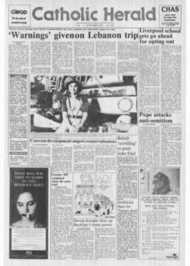Page 1, 1st September 1989
Page 1

Report an error
Noticed an error on this page?If you've noticed an error in this article please click here to report it.
Tags
Share
Related articles
John Paul Plan To Visit Bosnia
Holy Land Trip Raised By Pope
Church Has Failed Lebanon Synod
Lebanon Talks To Thaw Rome-orthodox Frost
Viviane Hewitt On Troubled Times For Papal Diplomacy
`Warnings' givenon Lebanon trip
by Viviane Hewitt in Rome FANATICAL Islamic groups have conveyed warnings to Pope John Paul 11 not to go ahead with his plans to visit Lebanon this month. The senior Christian figure in the civil-war torn country, General Michel Aoun, has also made it clear this week that the papal presence would not be welcomed, and would in fact be "unhelpful" in efforts to bring the 15 year conflict to an end.
A source in the Vatican secretariat of state told the Catholic Herald earlier this week
that "word has reached Rome from various Islamic quarters" concerning the possibility of a papal visit to Lebanon. "It may not be tantamount to a threat, but there is fear", he confirmed.
There is talk in the Vatican now that if John Paul does insist on travelling to Lebanon. it will be a one day affair, with no overnight stay. Dates between September 4 and 6 were under discussion, and the Papal Master of Ceremonies is thought to be preparing to fly to Beirut to make preparations for a Mass in the city.
While General Aoun has made it plain on behalf of the besieged Maronite Christian community that he heads that John Paul's presence in Lebanon would be both unwelcome and unhelpful, Moslem groups have been divided in their response.
Sheikh Mohammad Hussein Fadlallah, spiritual guide to Shia fundamentalists in west Beirut, has offered John Paul his personal pledge of safety, and has invited hint to "come and see the condition of children in our hospitals". By seeing the suffering of the people of west Beirut, the Sheikh said, John Paul will know that "the Christians who are bombarding Moslems are not being true to Christianity".
Reflecting on the Pope's most recent statements on Lebanon's crisis, Sheikh Fadlallah noted that
John Paul "has spoken only of Syria, forgetting that at the root of everything lies Israel's role which has produced the Palestinian tragedy. If he had spoken out with the same force about the destruction of Moslem regions as about the Christian zones, we could have said his was a prophetic voice. But he did not."
Walid Jumblatt, leader of Lebanon's 200,000 strong Druze community and a staunch ally of the Syrians, had issued a statement making it clear that his forces will not stop the Pope's visit, but adding that John Paul "will leave Beirut without learning anything of Lebanon".
More extreme groups in the conflict have, however, made plain their total opposition to the Pope's presence in their country. Shia leader, Nabih Berri, warned the Vatican against "joining in the game of the powers and the fleets plotting against us" — a clear reference to France's despatch of first a fleet to the eastern Mediterranean and now an envoy.
Ever since John Paul's emotional Feast of the Assumption appeal for peace in 1.ebanon — his tenth since Easter and the result of an intensification since April of the bombardment of Christian strongholds east and north of Beirut — discussion of a possible visit has been underway. The papal nuncio in Beirut, Archbishop Angeloni, has been studying the possibility of Pope John meeting Christian leaders at the winter seat of the Maronite Christian patriarchate, Nasrullah Sfeir at Bherke in the east of the city and Moslem chiefs at the patriarch's summer palace at Dimane in Syrian-controlled northern Lebanon.
Lebanon's Catholic community numbers some 1.4 million, divided between Maronites, Armenians and Greek Melkites. Those adherring to the Maronite rite form the largest grouping in the Christian population.
blog comments powered by Disqus











